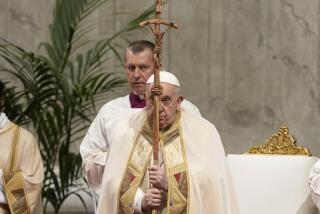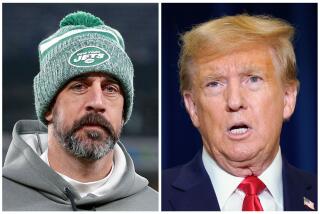Pope Strikes a Blow to Forces of Demonization
- Share via
Today, the pope will deliver an extraordinary address in which he will acknowledge the sins committed by Catholics and the church against Christians and non-Christians, especially Jews. The text has already aroused comment, often in the form of spin-control, from both those who are on the receiving end of the apology, and those who offer it. The general slant of the secular press and various nongovernment organizations has been, and will continue to be, a discounting of the event, something curiously echoed by voices within the Vatican itself.
For some, the apology does not go far enough; for others, it is a meaningless gesture, irrelevant to the modern world; for still others, it goes too far, suggesting that the church, not just sinners within it, can sin. But the reactions of those on the outside who minimize the event belie precisely the kind of ahistorical memory that most Europeans regularly criticize Americans for: We do not know how to evaluate events because we have no sense of their past. It seems particularly appropriate for medieval historians to provide a context here.
What the Pope does on the first Sunday of Lent in the year of the Great Jubilee, 2000, is an act of staggering novelty and daring, reflecting a revolution in thinking at the very center of the most hierarchized and centralized of all the religious institutions in world history. And he offers an apology precisely for the abuses of power that that institution--at its most authoritarian moments--committed in the name of the faith and the church. During that period (especially from about 1000-1750), myriad fervent believers--Jews and Christians--died at the hands of the Catholic inquisitors acting in the name of the Holy Mother Church; a further multiple died at the hands of crusaders for the faith. Quintessential messages of Christian faith--love and forgiveness--were trampled in terrifying exercises of thought control and sacred rage. And for centuries, the leaders of the church insisted that, whether these things were wrong, the church was neither responsible, nor need it apologize. As a professor teaching a course in heresy and inquisition, I can assure you that this apology is long overdue and nothing short of breathtaking.
The act of acknowledging error and sin, and the asking of forgiveness for it, is a painful process, one that creates great vulnerability. Indeed, we all have difficulty with the process, from self-criticism to public acknowledgment. And the task becomes ever more difficult the greater the failing, the more official the agent, the more authoritarian the personality. It is all the more painful for an institution that has formally sought, urbi et orbi, to claim infallibility. And now, to the city and to the world, this pope, John Paul II, declares that the earthly church has made mistakes, terrible mistakes, sins of devastating consequence both for the victims and the perpetrators. This is a revolution in Catholic thought, an overturning, in some cases, of fundamental traits that date back almost two millenniums. It is one of the most promising and impressive products of post-Holocaust culture anywhere in the world. In this long-meditated and profound gesture, John Paul II does something that John McCain tried to do on the fly: He has struck a blow at the forces of demonization within religion, and he has begun with his own religion and his own institutions.
The pope, however, is only the head of the church; and what this pope says can die on the vine if it does not become part and parcel of church teaching. The real issue is how widespread and profoundly this pope’s thinking spreads within his own institution and among Catholic laity. The acceptance of this apology by Catholics alone, regardless of whether Jews, Protestants, Muslims, seculars and others are mollified, contains the germs of a radical rethinking of the role of the church in the world, and of its relationship to those who do not choose to enter it. Last week, Cardinal Roger M. Mahony also issued an extraordinary public apology for the failings of the Roman Catholic Archdiocese of Los Angeles and of himself.
This is precisely the kind of thinking that, at some level, every religion, and certainly any religion that claims a monopoly on salvation, needs to do at the dawn of this age of global civilization.
This is not an easy task, and there are plenty of voices within the Vatican who resist such acts, not necessarily because they want to bring back the Inquisition, but because they know full well the radical implications of the follow-through. Their restraining language lies embedded throughout the official document, and reappears in the spin control of some of the more conservative theologians. But we, on the outside, should not treat this document with their reserve. Heretics and Jews of the Middle Ages would have thought the messianic age had begun to hear the church speak so, and surely a firm and consistent articulation of this voice would have changed the nature of the West’s painful path to modernity. This is an extraordinary opening to an enormous and fateful dialogue, an invitation to a profound exploration of the dynamics that lead from credal arrogance to inquisitorial hatreds, and of the ways to avoid those paths.
Just as with Germans, present-day Catholics are not so much guilty of what the church did, but minimally responsible for making sure that it could never happen again. The pope has sought to do so at a level of profundity that no other institution or culture has yet done. If he has not built the full apology or the full atonement in a day, or in a document, he has, nonetheless made that task possible in a way it has never been in the entire, long history of the Catholic Church, indeed in the history of civilization.
The terrain the pope has opened up with his apology, is an opening to a vast, complex, and rejuvenating conversation in which religions can learn to live with each other in mutual respect, rather than in a competition for empire. If a religion with so profound a commitment to learning and good works as Catholicism, turns to this kind of project with enthusiasm, then we can expect its renewal as a major, dynamic articulator of peaceful Christianity.
If the coming decades and generations are filled with the kind of honest discussion that the pope seeks to open here, then we, as a global community and an emerging global culture, can count ourselves fortunate. This is a great moment to be a Catholic; and a great moment to know those Catholics who, upon hearing the pope’s apology, are stirred to the kind of introspection that it calls for. The last thing any person knowledgeable about the Catholic past would want is for this effort on the pope’s part be the end, not the beginning, of a Catholic spiritual movement.


